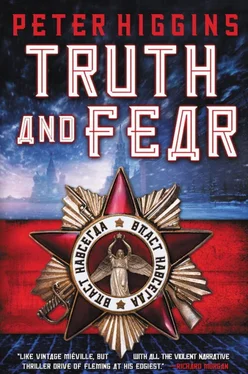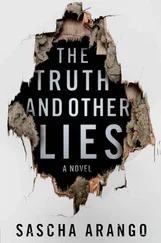They walked on, following the railway track. There were no landmarks. No horizon except the vanishing point of the track. Walking brought them no nearer to anything and no further away. Motion without movement. The birch trees receded in all directions, endlessly repeating mirrors of trees, misting into brown and grey, dimness and snow. Numberless, featureless and utterly bleak.
‘We’ll camp here,’ said Florian when the light began to fail. They had reached nowhere in particular.
They left the railway and pushed three or four hundred yards in under the trees, to a place where a heavy spruce had fallen, tearing its root mass from the earth, making a small clearing where scrub and thorn had taken root. Florian fished a small bag from his pocket and gave it to Lom. It held a fire steel and a clump of dry tinder: moss and leaves and small twigs, all dry and sweet.
‘Here,’ he said. ‘Keep the fire small. We should be far enough from the track, but we should take no risks.’
Lom gathered a bundle of branches and set them by. He scraped a patch of earth clear with his foot and checked the ground for shallow-buried roots that could catch and smoulder underground. There were no stones to make a hearth. He took a handful of tinder from the pouch and laid it ready: a tight clump in the middle, outside pieces pulled looser to let the air in. When the tinder was set he held the fire steel close above it and struck a shower of sparks. He got it first time, sweet, like he always did, and bent low to breathe on the faint smoulder. Gentle. Gentle. Encouraging the little flicks of flame to come alive. Breathing in the faint smell of woodsmoke.
The wood he had gathered was all damp. He chose a few of the smallest, driest pieces and set them round the smouldering tinder one by one, carefully, to shelter the frail young flame, to barely touch it and take it into themselves. He fed it with a little extra tinder when it started to fail and felt the first brush of heat against his face. A little cup of life in the gathering dark. When he was sure of the small fire, he picked out some of the larger branches from the pile and set them in a careful pyramid around the tiny fire, closing it in like a tent frame. The heat and smoke would dry them out.
Lom sat back for a moment and watched. A bitter breeze had risen as the light faded. The legs of his trousers were still soaked, and now he had stopped moving the cold of it chilled him. But the fire had steadied. It was breathing. He watched the lick of small quick colours, the sparks in the smoke, the heart of it growing stronger.
While Lom made the fire, Florian took a small hand axe from his knapsack and hacked an armful of larger branches from the fallen spruce. He propped them against the side of the tree and wove thinner stem-lengths through them to bind a strong, shallow-sloping wall, on which he piled deep armfuls of brush and damp earth, until he had made a low, dark tunnel closed at one end, with a mouth at the other. He took some branches still heavy with needles and cut them to size, to make a door for the entrance which could be pulled shut once you were inside.
When he had finished, he came across to the fire. Considered it with approval.
‘It’s good,’ he said.
He pulled a little pan from his knapsack and set it on the fire. Used the axe to cut a fist-sized chunk of pork into slices and dropped them in. ‘I raided the kitchen at Terrimarkh,’ he said. ‘The shelter is for you. You should spread more leaves inside on the floor.’
‘What about you?’
‘I have no need. I will not sleep.’
When they had eaten, Florian set some water to boil in the pan and scattered it with coffee grounds. Dropped in a small pebble of sugar. He set the pan aside to cool and then they drank from it in silence, alternating sips. The drink was dark and bitter and sweet and good. Night thickened between the darkness and the trees.
Lom sat quietly and stared out into the darkness, taut as wire.
Hundreds of miles to the south Eligiya Kamilova lay on her back on a narrow shelf in a crowded stinking cattle wagon. The train had been stopped for hours. There was the noise of other trains outside, shunting and moving slowly past. Shouted orders. Men talking. Narrow shafts of bright arc light beamed in through the gap near the top of the wall and splashed across her face. She did not know where they were. She was no longer hungry or thirsty. That had passed. She was not waiting. The time would come when it was ready to come. There was nothing to wait for.
The freight car door rolled open with a crash and light spilled in. Electric light and cold night air which smelled of bitumen and naphtha and trees. More people were being shoved inside, though there was no room. VKBD men swore at them as they hesitated. A woman started to shout and scream. Eligiya Kamilova couldn’t understand what she was saying. A young boy in uniform smashed her in the face with the butt of his rifle. That quieted her. Kamilova turned away, staring at the pitch-soaked wooden ceiling close above her face. It would be bad if she were seen looking.
When the door was rolled shut and locked again, she took another look at the new arrivals. They brought with them nothing. No bags. No coats. No food or water. They stood or crouched in the shadows. Some of the men on the lower shelves were jostled. They swore at the newcomers in low vicious voices and pushed them away.
There were two young girls in school clothes standing together near her, close and side by side, their faces drawn and scared in the harsh shadowy light. They were looking for somewhere to go, somewhere to be out of the way. Kamilova recognised them. It took her a few seconds to recollect their names.
‘Hey,’ she called across to them quietly. ‘Galina. Yeva.’
The girls looked round, trying to find where the voice was coming from.
‘Over here,’ said Kamilova. ‘Up here.’ The girls stared at her. They didn’t move. They had learned not to trust the friendly voice. The invitation. ‘You are Elena Cornelius’s girls aren’t you. Do you remember me?’
‘No,’ said Yeva.
‘Yes,’ said Galina.
‘It is Eligiya,’ said Kamilova. ‘I know you. I know your mother. From the raion. I am her friend.’ She swung herself awkwardly down from the high shelf and squeezed her way towards them, stepping over the tightly packed people sitting on the floor.
‘Is your mother with you?’
‘No,’ said Galina.
‘Do you know where she is?’
‘No. She was left behind.’
Hours later, Kamilova lay on her shelf listening for the sound of movement outside the train. There was none. For half an hour, as well as she could judge, there had been none. The arc lights still burned. It must have been nearly dawn. She climbed slowly, carefully down and went to find the girls. They were sitting together on the floor, backs against the door. Yeva was asleep. Galina was watching her with wide blank eyes.
Kamilova knelt down and nudged Yeva gently awake.
‘Get ready,’ she whispered. ‘I am going now and you’re coming with me.’
‘Where are we going?’ said Galina.
‘Do you want to stay on the train?’
‘No.’
‘Then it’s time to get off.’
Kamilova stood up and pulled the girls to their feet. They looked uncertain and confused but they did it.
‘When I say,’ said Kamilova, ‘run. Stay together and stay with me and run as fast as you can. Whatever happens don’t stop. Don’t listen to anything else but me. Don’t look back and don’t stop running unless I say.’
She turned to face the doors, closed her eyes and took a breath.
Calm. Calm. Think only of the night and the air.
The timbers of the massive heavy door screamed. The wood fibres ripped as it bowed and bellied outwards and split and burst and sprang from its rails and crashed to the ground below.
Читать дальше


![Кэмерон Доки - Правда и ее последствия[Truth and Consequences]](/books/79610/kemeron-doki-pravda-i-ee-posledstviya-truth-and-con-thumb.webp)









